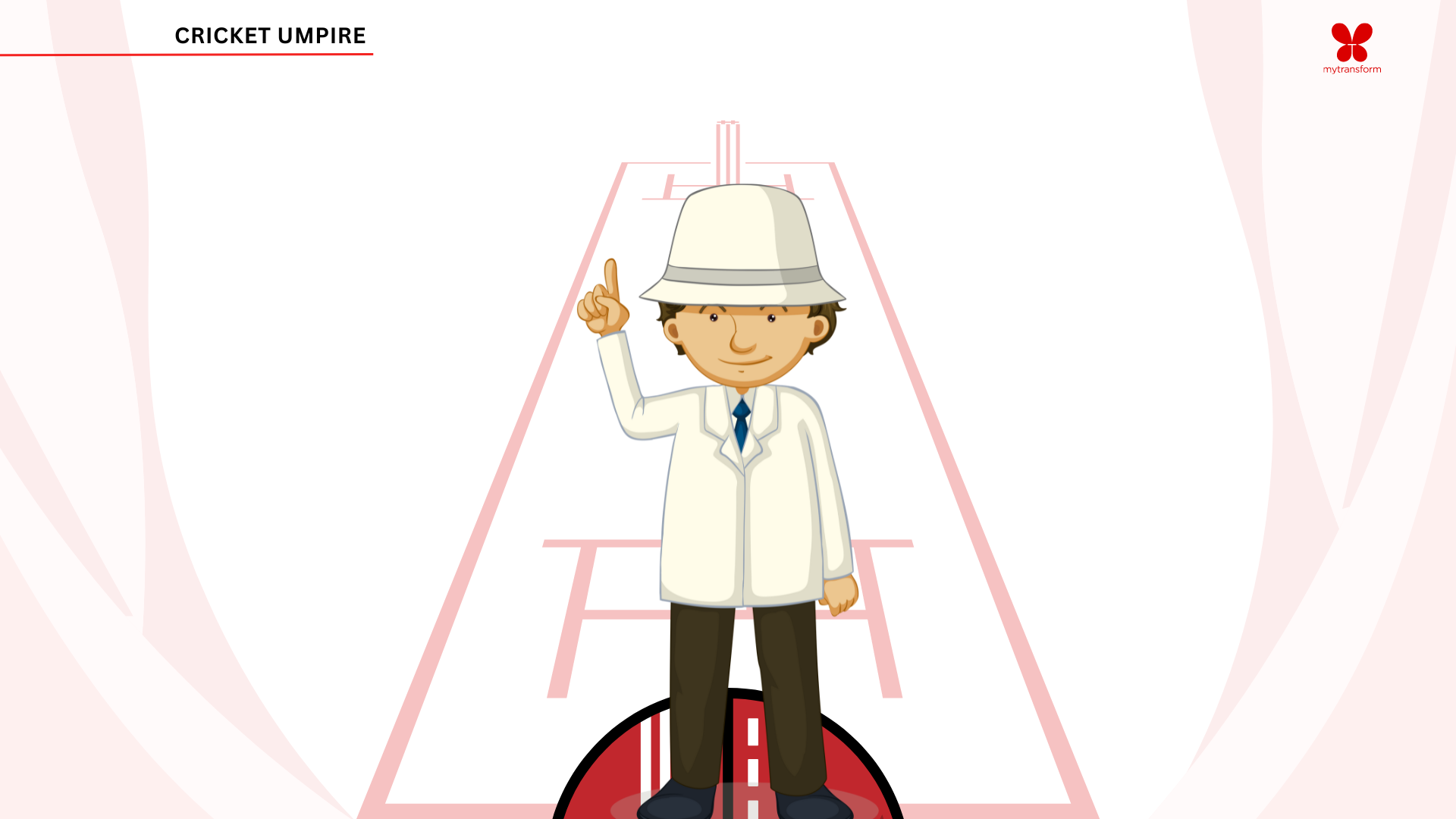
Cricket is not just a sport in India. It is a religion and cricketing events are no less than a festival in India. In the centre of the play stands two people sporting different colours who are the most powerful decision-makers. This article discusses ‘How to become a Cricket Umpire in India?’, their roles, responsibilities, and most importantly, the key traits to be a Cricket Umpire.
Although the roots of the sport lie in England, India is the major player in Domestic and International arenas. India is the richest producer of Cricketing talent in the world.
However, India has very little representation of Indian Umpires in International Cricket. Since Covid-19, Indian umpires are presiding over international tours and events.
The initiatives of BCCI are training and empowering umpires to international standards.
Let’s know more about Indian Cricket Umpires- umpiring courses in India, umpire salary per match, BCCI umpire salary, in this article.
Who is a Cricket Umpire?
A Cricket Umpire is a ground official of the Cricketing organization tasked with making decisions during the course of a match both on and off the field. The decision of an umpire is final in the match.
An Umpire ensures fair play on the ground, checks on ground equipment, and rules of the game are followed.
They also ensure the spirit of the game is upheld. There are ground umpires and off-field third umpires who review the decisions challenged by teams.
Third Umpires also decide on the decisions referred by ground umpires which cannot be confirmed on the ground.
Although the decision of an umpire is final, sometimes mistakes happen. The new rules allow challenging the decisions of umpires by the fielding captain and batsman. Umpires enforce the rules of the game as laid out by the administering bodies.

Trusted by 77,000+ Students
Take the first step towards your dream career.
Kick start your career today!
Roles and Responsibilities of a Cricket Umpire
General Responsibilities
-
- Check for weather conditions before and during the match and adopt playing conditions.
-
- Delay or halt play due to poor lighting conditions.
-
- Check for the condition of the playing ball and replace it if needed during play.
-
- Assess ground conditions before the match.
Responsibilities of the Bowler’s End Umpire
-
- Keep an eye on the bowler’s foot for no-ball.
-
- Indicate runs scored by boundaries, leg byes, byes, and overthrow.
-
- Indicate outs, no-balls, wide, bouncers, free hits, penalties, powerplays, and breaks.
-
- Check for LBWs, caught behind, and run out from the bowler’s end.
Responsibilities of the Square Leg Umpire
-
- Check for height no-balls, runouts at the striker’s end, stump out and refer to the third umpire for inconclusive decisions.
-
- Indicate bouncers and full toss no-balls and consult with the umpire at the bowler’s end for LBWs and
Responsibilities of the Third Umpire
-
- Provide conclusive decisions for appeals by on-field umpires for run-outs, stumps, boundaries, and catches.
-
- Review challenged decisions and provide a decision either to uphold or overturn the field umpires.
-
- Change playing conditions in weather-affected matches using DLS methods.
Skills Required to Become an Umpire
-
- Spontaneous decision-making ability
-
- Excellent Communication skills
-
- Physical fitness and stamina
-
- Knowledge of the rules of sport
-
- Handle on-ground and spectator pressure
-
- Courage to own decision
How To Become an Umpire in India? Step-by-Step Guide
Here is a step-by-step guide to becoming a Cricket Umpire in India.
-
- Step 1 – Become a member of the State Cricket Association.
-
- Step 2 – Get State Association sponsorship and enrol with BCCI Umpire Academy for the Umpire Certification Program.
-
- Step 3 – Pass the Umpire Certification Exam conducted by the academy.
-
- Step 4 – Participate and Officiate matches organized by your State Cricket Association.
-
- Step 5 – Accumulate 2-3 years of umpiring at the state level and apply for BCCI Level 1 exam and clear it.
-
- Step 6 – After passing the Level 1 exam, apply for Level 2 certification and clear it to officiate matches at the national level.
-
- Step 7 – If you intend to elevate your career in cricket umpiring, request a recommendation from BCCI to take up umpiring certification from ICC for umpiring in International matches.
Cricket Umpire Course
Cricket umpiring can be said to be less theory and more training led. Theoretical classes are short-term based on the rules for the cricket sport laid by the Marylebone Cricket Club (MCC) in London. Aspiring candidates must become a member of the state cricket association and enrol in the BCCI umpire Academy.
Cricket Umpire Certification
Board of Control for Cricket in India (BCCI) certifies Cricket Umpires to handle Domestic and national Tournaments like the Indian Premier League (IPL), Ranji Trophy, Syed Mushtaq Ali Trophy, Irani Trophy, etc. ICC certifies umpires for International Tournaments and events like World Cup, the Bi-lateral series, the Tri-lateral series, etc.
Umpire Training in India
Umpire training in India is provided by the BCCI Umpire Academy located within The National Cricket Academy in Bangalore. The academy provides necessary training to umpires sponsored by state cricket bodies. The academy on regular schedules holds certification exams for umpires to preside in domestic tournaments. Exceptional umpires in domestic circuits are sponsored by BCCI for ICC umpires Academy to get certified to be International umpires.
Salary of a Cricket Umpire
Umpires do not receive fixed payments but on the number of days, on which they officiate a match both domestic and national. Indian umpires are categorized into different groups based on their age, certification, experience, etc. Umpires in A+ and A Categories are paid Rs.40,000/- per day for domestic matches and those in B and C are paid Rs.30,000/- per day.
Pros and Cons
Pros of Becoming a Cricket Umpire:
-
- Good Salary
-
- Travel to different places, domestic and international
-
- Less Workload
-
- Less education requirement
Cons of Becoming a Cricket Umpire:
-
- High stress while on the job
-
- Need to make spontaneous decisions
-
- Social media and Spectator pressure
Summary
-
- An Umpire is the most powerful person in a cricket ground. Their decisions are final and must always be in line with the rules laid by the MCC.
-
- As much as the perks of the job, there is too much social and spectator pressure one must be able to handle.
-
- BCCI and ICC are the key organizations responsible for certifying umpires at National and International levels.
Frequently Asked Questions
How To Become Umpire In BCCI?Aspiring candidates must complete the level 1 and level 2 umpiring exams conducted by the BCCI Umpire Academy to become a BCCI umpire.
What is the Salary of an Umpire In IPL?Cricket Umpire salary is not fixed. Depending on the categories of the umpire, they are paid Rs.30,000-Rs.40,000 per day for domestic matches.
What is the Salary of a BCCI Level 1 Umpire?Level 1 umpires of BCCI belong to categories B and C. They are paid a remuneration of Rs.30,000/- per day for domestic matches.
What is the Salary of an International Cricket Umpire?International Cricket Umpires are paid between $1500-$5000 per day depending upon the format of the match along with other accommodation and travel facilities.
How to Become a Third Umpire in Cricket?There is no specific way to become a third umpire. All ground and off-field umpires go through the same assessment procedures. Onground and third umpires usually rotate between matches.
What are the Duties of a Third Umpire in Cricket?Third umpires provide conclusive based on video and technological evidence to verify appeals by umpires and players when the DRS method is used.
Can a Non-Cricketer Become an Umpire?Yes, a Non-Cricketer can certainly become an Umpire. One must have a good knowledge of the game to become an umpire.
Is Umpiring in Cricket a Hard Job?Umpiring is a hard job as it requires the ability to make spontaneous and hard decisions.
What is the Age Limit for a Cricket Umpire?There is no upper age limit to become an umpire. However, there are certain physical and health conditions that need to be met to officiate a cricket match.
Do Umpires make Good Money?Yes, umpires make good money in all domestic, national, and international tournaments. Read the article above and learn more on how to become a cricket umpire in India.




